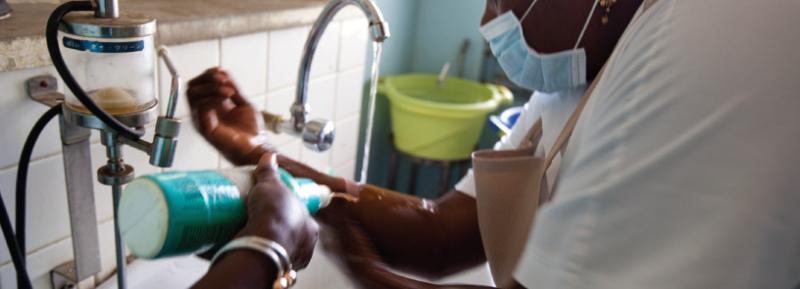Where We Work
See our interactive map


South Sudan is one of several conflict regions today that face a grave scarcity of human resources for health. The recent surge in violence last month has worsened the humanitarian crisis and taken a huge toll on refugee camps, where individuals are experiencing malnutrition and diarrhea at high rates.
The UN Protection of Civilians Mission in South Sudan and other refugee camps throughout the country currently shelter a combined population of over 933,000 refugees. Ensuring access to water, sanitation, and hygiene (WASH) is a major priority.
WASH is one of the most cross-cutting public health interventions, especially in a humanitarian crisis.
The effects of WASH have far-reaching impacts that enhance infant, child, and maternal health; reproductive health; nutrition; and protection from parasitic infection and water-borne diseases. As a result, WASH is one of the most cross-cutting public health interventions, especially in a humanitarian crisis.
Through concerted efforts with UNICEF and other WASH partnerships, frontline health workers play a central role in accelerating and sustaining delivery of WASH services to vulnerable communities in South Sudan, providing not only access to safe drinking water during emergency responses, but also encouraging WASH standards and guidance as sanitary officers within the camps.
Most recently, as dozens of suspected cholera cases were reported across the country in July, community health workers worked with NGOs and the government to coordinate a quick and effective response to prevent an outbreak.
As part of South Sudan’s Ebola Preparedness Campaign, UNICEF’s frontline workers played a key role in raising awareness about how hand washing can help prevent the spread of Ebola and similar viruses among the community. Where soap was not readily available, communities were educated on washing their hands with ash—a suitable alternative.Situations like these are not unique to South Sudan.As it stands today, the global population is facing the largest humanitarian crisis in history, with over 65.3 million forcibly displaced people. Frontline health workers in these resource-constrained settings must often rely on adaptiveness and innovation to meet the surging demands for potable water, soap, toilet paper, water basins, and other commodities central to WASH.
This raises the question of the dangers that they as individuals are exposed to when challenged with limited access to WASH services. Whether they are attending to refugees within camps or to patients at health care facilities outside the camps, frontline health workers have a right to serve in sanitary, hygienic, and dignified conditions, along with the patients they serve.
Ensuring access to WASH services plays an important role in safeguarding the health and well-being of individuals and communities. It plays an equally important role in protecting the health workers who protect our communities. A lack of basic WASH services compromises the ability to provide safe care and presents serious health risks to both those who seek treatment and those who provide it.
Out of 54 low- and middle-income countries surveyed, only 25% had policies or targets for WASH in health facilities.
A recent report by the World Health Organization (WHO) found that out of 54 low- and middle-income countries surveyed, only 25% had established policies or targets for basic coverage of WASH in health care facilities. Global Health Council (GHC) is working to increase awareness and action around the pressing need for adequate WASH services in all health care centers.Earlier this year, GHC cohosted a World Health Assembly side event with WaterAid and other partners to discuss barriers to WASH access in health service delivery and how to close these gaps in vulnerable communities. Local government officials, the private sector, international NGOs, and other stakeholders explored different leadership opportunities and highlighted efforts already underway across the health sector.
Both the global health and WASH communities are unequivocally invested in providing WASH services for people in crises and the frontline health workers that serve them.As refugees flee crises all across the globe and a severe scarcity of health workers in these regions persists, a host of actors—including governments, NGOs, and public-private partnerships—must strengthen WASH strategies to combat disease before it strikes.
This post was originally published on the Frontline Health Workers Coalition blog.
Get the latest updates from the blog and eNews




